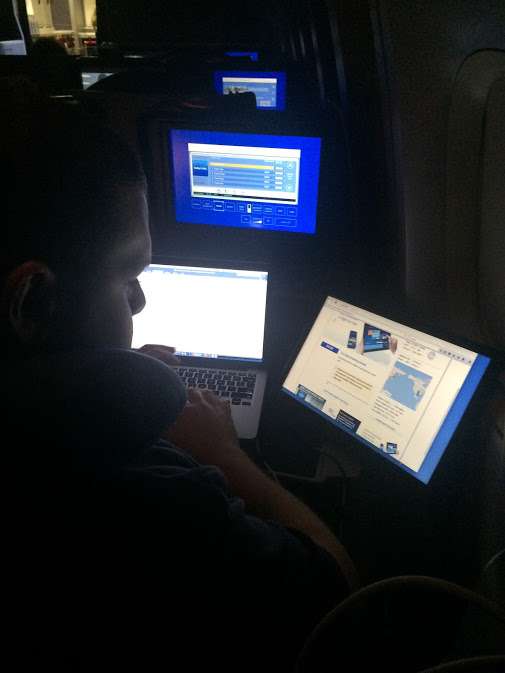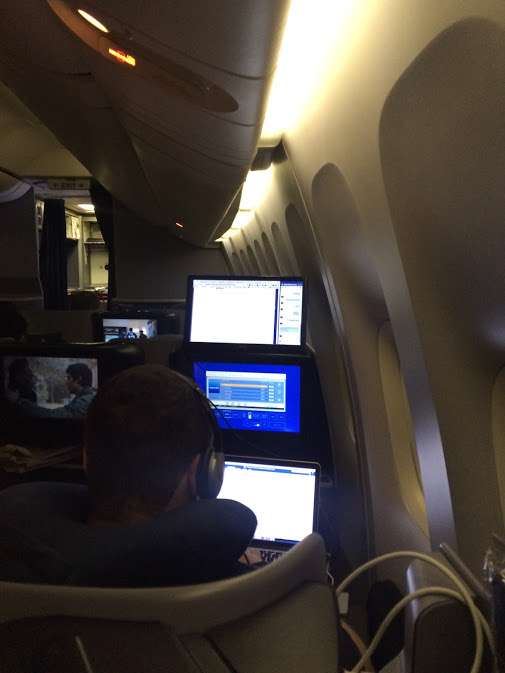The Volokh Conspiracy
Mostly law professors | Sometimes contrarian | Often libertarian | Always independent
Why United Does Not Allow You To Use In-Flight Screen As Extended Display
The limitation is not technology, but confidentiality.
For more than a decade, I have traveled with an extra monitor. It is a life-saver for productivity on the go. Plus, if you keep an HDMI cable, you can use the in-hotel TV as a third display (assuming the inputs are easily accessible). When I am upgraded to business class on an international flight, I have enough room to use both my laptop and external monitor.

Then again, on a flight to Japan, a divine wind caused severe turbulence, and my monitor fell off the top of the seat, and cracked. I didn't do that again. Yet, I've always wanted more screens. I called United many years ago and asked if I could connect my computer to the inflight entertainment screen. There are inputs, and with the right adapters, I could make it work. After some hold, I was told the answer was no, without much explanation. And I thought it would be a bad idea to connect without permission, so I haven't done so.
Yet, I've always wanted more screens. I called United many years ago and asked if I could connect my computer to the inflight entertainment screen. There are inputs, and with the right adapters, I could make it work. After some hold, I was told the answer was no, without much explanation. And I thought it would be a bad idea to connect without permission, so I haven't done so.
In recent years, United has installed 4K screens with bluetooth functionality. It should not be difficult to set up wireless screencasting from a device directly to the screen. But that is still not an option. Why?
Finally, I've found out the reason, via The Points Guy:
As more travelers bring their own tablets and laptops on board, I've always wondered why airlines don't offer a screencasting feature on the entertainment screens. After all, it's a lot easier to get work done with some additional screen real estate.
Turns out, United can already technically enable screencasting today, Green said, but a major issue will likely mean that flyers will never see this functionality.
"We've had a lot of pushback from our corporate partners that say they don't necessarily want their staff using publicly available screens," Green said.
It's not that United would have access to any data; it's that they don't want nosy passengers snooping in on their neighbors.
Fascinating. Companies are worried that employees on travel will inadvertently disclose their confidential information on a display, which others can see.
This concern is valid. In the past, I have routinely seen people work on confidential information. I've seen judges write opinions. I've also seen lawyers review documents marked "confidential." And so on. Now, my vision is not as good as it was, so it is difficult for me to read text from more than a row away. But when a person is sitting next to me, I can easily see their screen. Some people have screen protectors on their laptops, but if they were to screencast, that benefit would vanish.
Do I worry about people seeing my screen? Not really. Almost everything I write is intended for public consumption. Maybe my neighbor might see a draft line that I intend to remove, but that risk is low. As for my emails and messages, I generally assume everything I write will one day be blasted on the front page of the New York Times, so I choose my words carefully. (There is not much difference between the messages I write and the blog posts I publish.)
I hope United does reconsider this option at some point. Having one more screen in economy would make my productive increase even more.
Update: A reader writes in with an obvious comment that did not occur to me:
The obvious reason not to let people put things on the screens you own in public is that invariably people will put porn on them, and then you'll have other people complaining that the united screen system is showing porn.
They don't say this because no corporate PR hack is going to talk about porn when it's not necessary. But it's definitely the real reason, and it's one they will not and should not budge on.


Show Comments (24)